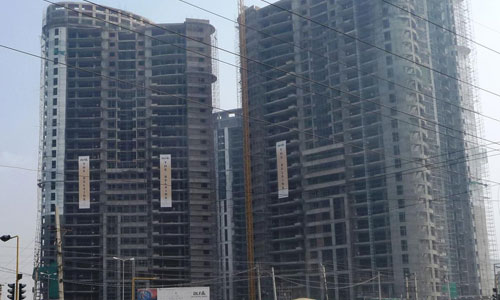By: Ravi Sinha
Track2Realty Exclusive
 When the Competition Commission of India (CCI) alleged that DLF misused its dominant market position and imposed unfair conditions on home-buyers of two of its many projects, the real estate fraternity, legal experts and others strongly questioned the basis of the CCI order and the enormous penalty of Rs.630-crore levied on the real estate major. However, now that the real estate sector itself has approached the CCI through its apex body CREDAI against the cement cartel, the issue of CCI jurisdiction has yet again surfaced. The moot point in the real estate sector today is whether the nature of realty business and its ancillary units fall under the CCI purview and the logic of CCI in determining the relevant market based on all India sales of select companies.
When the Competition Commission of India (CCI) alleged that DLF misused its dominant market position and imposed unfair conditions on home-buyers of two of its many projects, the real estate fraternity, legal experts and others strongly questioned the basis of the CCI order and the enormous penalty of Rs.630-crore levied on the real estate major. However, now that the real estate sector itself has approached the CCI through its apex body CREDAI against the cement cartel, the issue of CCI jurisdiction has yet again surfaced. The moot point in the real estate sector today is whether the nature of realty business and its ancillary units fall under the CCI purview and the logic of CCI in determining the relevant market based on all India sales of select companies.
While the DLF has challenged the CCI verdict before the COMPAT, real estate companies, legal experts and industry bodies are keenly awaiting the tribunal to define the jurisdiction of the CCI as clear the concept of relevant markets far as real estate sector is concerned. Reiterating the industry sentiments, Lalik Kumar Jain, President of CREDAI asserts that real estate market is fragmented and very competitive and monopolistic practices can’t even be dreamt of.
Industry body NAREDCO also maintains that what falls under the Transfer of Property Act can not be termed as service and can not be imposed with retrospective effect. Sunil Dahiya, Senior Vice President of NAREDCO questions how a developer could have known on the Act in 2006-07 (when applications were submitted first and agreements were signed) when the Act came into force only in 2009. “We at NAREDCO are determined to sort it out. We are soon going to meet representatives at various policy level, including the CCI, because we find it to be borne out of trust deficit than abuse of market dominance. We do hope to fill the trust deficit so that such instances are not seen in future,” says Dahiya.
The argument of CCI has been that DLF is dominant in the relevant market and has abused the dominance. To define the market, CCI has used the product market as well as the geographical market. They said that the product market is high end apartments and geographically, it is in the Gurgaon area. Using data of all India sales of housing and construction companies CCI has held that DLF has abused its dominance in high end residential accommodation in Gurgaon. In light of this, this would be one of the first issues to be challenged.
Therefore, issue like whether a home-buyer from Delhi look in Gurgaon or NCR, whether secondary sales and investment sales should be an integral part of the relevant market are some of the issues which will come up during the appeal hearing.
However, it is quite obvious that the issue has now gone beyond whether DLF is dominant in the market and has abused the dominance. The issue is more about the CCI methodology and parameters to define the real estate product market and the geographical market.
The moot point is does the CCI also have jurisdiction over the nature of trade practices in real estate? After all, the scope of competition law comes into force generally when there are exclutionary trade practices which create barriers for the other competing players in the segment. Failing this, competitive and fragmented nature of the business does not invite any competition law.
“CCI is meant for controlling malpractices in terms of unfair competition as defined under the ambit of Act. However, drawing an inference that it will invite CCI intervention in every aspect of real estate business is not well founded. Real estate is such a fragmented sector with highly competitive nature of transactions and hence the developers can never come under the CCI. I still maintain that CCI verdict on DLF was overreaching its ambit and very erroneously concluded by CCI,” says Jain.
If CCI verdict is upheld, it will amount to all builders in danger of coming under the jurisdiction of the competition commission. Would the slew of builders across the country very much be amenable to this kind of interpretation?
Some lawyers believe that the CCI judgement could be used as a precedent even in the consumer courts where there is not a dominance and the litigant has been trying to prove that the agreement is one sided. They maintain if DLF is guilty then there is also violation of the provisions of various statutes that the government institutions are actually supposed to administer.
Going by the CCI’s definition of abuse of dominance, HUDA and DTCP, by virtue of being public bodies, had also facilitated this abuse of dominance by providing DLF with the necessary ammunition to act in an illegal, unfair and irrational manner by allotting land and giving licenses, permissions and clearances to the company despite the evidence that the company was taking buyers for a ride.
Since its inception in 2003, the Competition Commission of India has been in the news, and for all the wrong reasons. Members of the judiciary challenged those provisions of the Act that they perceived to be an encroachment into their jurisdiction. In particular, they questioned the legality of the clauses under which the government could exclude members of the judiciary while considering candidates for heading the CCI. The legal tangle was so complicated that Deepak Chatterjee, who was the commerce secretary at the time and was to head the CCI, could not take charge of his new responsibility.
The big question today remains unanswered till the time a final verdict on CCI penalty over DLF comes out in the open. Whether this CCI will now regulate the real estate across the board, or the jurisdiction of the CCI only kicks in selective manner.





